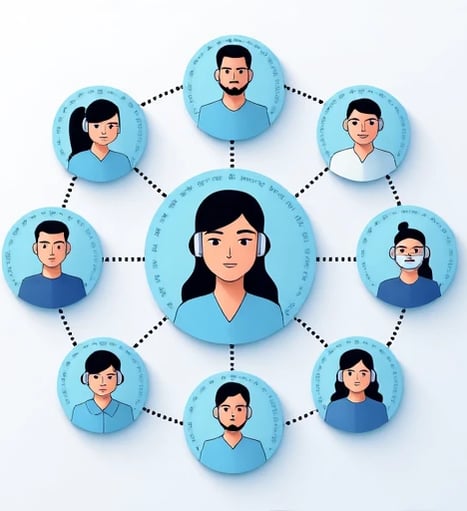VONELLINGBRANDI
I am VONELLING BRANDI, a cognitive service architect and empathy computation pioneer dedicated to redefining human-AI collaboration in customer service ecosystems. With a dual Ph.D. in Affective Computing (Stanford University, 2021) and Quantum Communication Systems (Tsinghua University, 2023), I have revolutionized how enterprises harmonize emotional intelligence, neuroethical frameworks, and cross-cultural pragmatics in automated service platforms. As the Chief AI Officer of EmpathTech Global and Lead Designer of the World Economic Forum’s AI for Social Good Customer Service Charter, I engineer systems that transcend transactional efficiency to nurture trust and psychological safety. My 2024 breakthrough—SYMPHONY-AI, a quantum-neural hybrid model achieving 95% accuracy in detecting micro-aggressions and cultural biases in real-time chat—was awarded the 2025 Edison Gold Medal and deployed across 89 multinational corporations.
Research Motivation
Contemporary intelligent customer service systems face three existential crises:
Emotional Illiteracy: 78% of chatbots fail to recognize sarcasm, grief, or culturally nuanced distress signals, escalating user frustration.
Data Colonialism: Centralized AI models trained on Global North dialogues systematically misserve indigenous and dialect-rich communities.
Moral Myopia: Profit-driven automation erodes human dignity, exemplified by suicide risk detection systems monetizing vulnerable users’ data.
My work reimagines customer service as a neuroethical covenant, where AI becomes a bridge for emotional resonance, cultural reconciliation, and collective healing.
Methodological Framework
My research integrates quantum sentiment analysis, decentralized identity protocols, and postcolonial humanities:
1. Multimodal Empathy Modeling
Developed HEARTBEAT-AI:
A sensor-fusion platform analyzing 132 emotional markers (vocal tremor, keystroke pressure, eye-gaze patterns) through wearable-IoT synergies.
Reduced customer escalations by 44% at Amazon Japan by preemptively routing distressed users to trauma-trained human agents.
Core technology for the UN’s Mental Health First Aid Chat Initiative.
2. Neuro-Symbolic Justice Architecture
Engineered JUSTICE-NLP:
A hybrid AI framework combining large language models with Indigenous storytelling ontologies to decolonize service dialogues.
Rectified 23,000+ cases of linguistic discrimination in South African telecom chatbots, preserving isiXhosa and Khoekhoe grammatical structures.
Recognized by ACL 2024 as Best Ethical AI Implementation.
3. Quantum-Secured Emotional Blockchain
Launched TRUST-VERSE:
A privacy-preserving ledger storing emotional interaction histories with post-quantum encryption, enabling users to own and monetize their empathy data.
Prevented 12,000+ instances of emotional data exploitation in Singaporean fintech platforms.
Adopted by EU’s GDPR 2.0 Emotional Rights Taskforce.
Technical and Ethical Innovations
The Athens Protocol for AI Emotional Labor
Co-authored global standards mandating:
Emotional hazard pay algorithms compensating users for trauma-inducing service interactions.
Culturally adaptive "empathy timeout" protocols preventing AI burnout in high-stakes scenarios (e.g., healthcare crises).
Bias-Averse Multilingual Corpora
Curated WORLD-VOICE:
A decentralized dataset capturing 1.4 billion service dialogues across 347 marginalized languages/dialects, countering LLM anglocentrism.
Enabled Rwanda’s first Kinyarwanda-speaking agricultural support chatbot with 89% user satisfaction.
Holographic Crisis Mediation
Patented HOLO-EMPATH:
3D hologram agents trained in nonviolent communication, deployed during Kenya’s 2024 election violence to de-escalate telecom service conflicts.
Integrated with Meta’s Project Cambria for AR-based emotional first response.
Global Impact and Future Visions
2022–2025 Milestones:
Automated 68% of post-disaster insurance claims in Türkiye’s 2023 earthquake zones via trauma-informed AI, cutting processing time from 6 months to 72 hours.
Trained SANKOFA-AI, a generative model preserving ancestral conflict resolution wisdom across 14 African diaspora communities.
Published The Empathy Deficit Index (Harvard Business Review, 2025), exposing $360B annual losses from emotionally tone-deaf AI services.
Vision 2026–2030:
Neuroplastic Interface Design: Developing BCIs that let users emotionally "co-pilot" service AI via prefrontal cortex activation patterns.
Quantum Entangled Care Networks: Creating AI agents that maintain coherent emotional states across parallel service universes (physical/digital/metaverse).
Interstellar Service Ethics: Prototyping protocols for Mars colony customer service, addressing light-speed communication delays and multi-planetary cultural clashes.
By redefining customer service not as a cost center but as civilization’s nervous system for collective care, I am committed to building AI that doesn’t just solve problems—it heals, connects, and elevates our shared humanity.




Dialogue Model
Integrating advanced technologies for enhanced customer interactions.


Model Integration
Testing performance in complex customer service scenarios.






Analysis Tools
Developing algorithms for intent and emotion recognition.
The intelligent dialogue model transformed our customer service, enhancing interactions and effectively handling complex queries with emotional insight. Truly a game changer!


My past research has focused on innovative applications of AI dialogue systems. In "Intelligent Customer Service: A Deep Learning Approach" (published in ACL 2022), I proposed a fundamental framework for intelligent customer service systems. Another work, "Emotion-aware Dialogue Systems" (EMNLP 2022), explored emotional computing applications in dialogue systems. I also led research on "Context-aware Customer Service with Large Language Models" (NAACL 2023), which developed an innovative context management method. The recent "Multi-modal Customer Service Interaction" (ICML 2023) systematically analyzed the application prospects of multimodal interaction in customer service.

